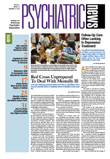Recently instituted federal rules that implement a citizenship requirement for Medicaid eligibility have drawn the fire of APA and other mental health advocacy groups concerned about the impact of the new mandate on beneficiaries with mental illness, among others.
The new Medicaid rules implement part of the 2006 Deficit reduction act and require states to document citizenship for all new and current Medicaid beneficiaries or lose their federal Medicaid funding.
APA raised concerns that some eligible applicants may encounter“ documentation barriers” that prevent them from meeting the requirements, according to an august 11 letter from James H. Scully Jr., M.D., APA medical director, to Mark McClellan, M.D., director of the Centers for Medicare and Medicaid Services (CMS).
The APA letter, submitted as part of CMS's 30-day comment period on rules implementing the documentation requirements, said applicants with psychiatric disorders, foster children, homeless people, those with language barriers, and people displaced by disasters would find it difficult to meet the requirements for proving that they are U.S. citizens.
The letter was one of many that mental health advocates sent to CMS as part of the public-comment period that lasted until mid-august. The rules have been in effect since July 6, although federal officials have the option to amend them based on comments they receive.
Congressional supporters maintained that the new requirement would address concerns that illegal immigrants were falsely claiming citizenship to receive Medicaid benefits.
APA applauded a decision by CMS in early July to allow states to exempt the approximately 8 million people already enrolled in the Supplemental Security income or Medicare programs. Critics of the proof-of-citizenship policy, including APA, said that it endangers the health care of about 40 million recipients not included in those exemptions.
APA's concerns center around the challenges many with mental illness will face when trying to locate and provide citizenship documentation to Medicaid officials in the face of mental conditions that can hinder their ability to collect and submit the necessary paperwork. Delays in providing such documents may lead to delays in or loss of mental health care coverage, which could have a serious impact on those with mental illness.
“It is important to ensure that health care, especially mental health care, is provided without undue delay or disruption to those who need it,” Scully said in the letter to CMS.
Federal law specifies that both undocumented immigrants and immigrants with legal status are generally ineligible for Medicaid and the State Children's Health Insurance Program (SCHIP), regardless of their length of residence in the United States. Except for refugees and those seeking political asylum, legal immigrants are ineligible for Medicaid and SCHIP during their first five years in the United States. After that, they may apply for assistance. All immigrants, regardless of their legal status, are eligible for Medicaid coverage of emergency treatment, if they cannot afford it.
In addition to concerns about those with mental illness, the measure may prevent Medicaid access for up to 2.3 million U.S.-born citizens, including 1.6 million children and 600,000 adults, who may lack birth certificates or passports, according to the Center on Budget and Policy Priorities, a nonpartisan research organization that studies the impact of economic policy on low- and middle-income individuals.
Congressional Democrats have charged that the requirements will likely only transfer the costs to hospitals through increased emergency room visits by the uninsured, thus exacerbating financial problems hospitals already face.
States were required to begin compliance with the new Medicaid requirements on July 1. However, CMS did not publish its implementation rules until July 12, and then the rules were made retroactive only to July 6. The cumulative effect of the hurried implementation and the rush by states to then adopt and implement the regulations “may impede applicants from receiving or continuing to receive health care benefits through Medicaid,” Scully wrote.
A similar letter from the National Mental Health Association noted that although the new regulations allow additional types of documents beyond original copies of passports, birth certificates, and driver's licenses to show citizenship, they fail to include sufficient protections to accommodate the challenges facing many individuals with mental illness who rely on Medicaid. Although the regulations direct states to assist special populations, including those with mental illness, the extent to which states have to go to help these people prove citizenship is vague and thus“ meaningless,” the advocacy group wrote.
An August 8 letter to CMS from NAMI Executive Director Michael Fitzpatrick, urged CMS to amend the rules to allow benefit applicants to submit copies of required documents, instead of originals. The requirement for original documents will likely require in-person exchange of documents and create an additional burden on beneficiaries, while delaying benefits.
Two pending federal lawsuits challenge the legality of the documentation requirements. One suit calls for an injunction to stop the government of the District of Columbia from applying the new requirements, and the other, filed in federal district court in Chicago, asks the court to block the law's implementation.
Senate critics of the measure attempted to pass a bill in late June to delay the eligibility documentation rules but their plan was blocked by Republican leaders. The bill, introduced by Sen. Daniel Akaka (D-Hawaii), would have delayed implementation until January 31, 2007, and allowed states more time to implement the changes and for CMS to inform Medicaid beneficiaries and future applicants about the changes.
Scully also noted in his letter to CMS that the law requires the establishment of an outreach program to those likely affected by the new documentation requirements, but such a program has not been put in place.
A copy of the CMS interim final rule is posted at<www.cms.hhs.gov/MedicaidEligibility/downloads/MedicaidCitizenshipFinalRule.pdf>.▪
